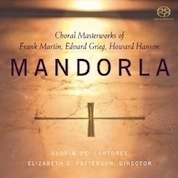This is a very ambitious program, headlined by a work that has enjoyed many fine recorded performances, and filled out with several substantial pieces that rarely if ever appear on disc. To be sure, the choir Gloriae Dei Cantores is an excellent ensemble with many fine recordings to its credit, and its effort here ranges from successful–Howard Hanson’s The Cherubic Hymn–to respectable–Frank Martin’s Mass–to disappointing–the Four Psalms (Fire Salmer) by Edvard Grieg.
In the Mass, the humidly resonant acoustic sabotages any chance at clarity of what already are dense enough textures, especially in the louder, fuller sections, and the balance suffers a loss in the bass register. Nor are we granted any sense of the work’s antiphonal character. Many listeners will enjoy the choir’s free and full vibrato sound, particularly evident from the sopranos, while others will prefer a vocal sound that’s less “busy”, more uniformly balanced, and more solid in execution of some of the trickier melodic lines, found on the reference recording by the Dale Warland Singers. Nevertheless, Gloriae Dei Cantores’ expressive intensity and overall command of a difficult piece reveals a sincere commitment to the profoundly personal, spiritual nature of Martin’s work.
I’m certain that some listeners will disagree, but the Grieg pieces just aren’t all that interesting, or even really great music, and the style of writing–overwrought and overlong–doesn’t do the singers any favors. Based on some folk tunes and religious poetry that Grieg apparently loved, these “psalms”, which he also hoped would inspire pride in the Norwegian people, are long on late-Romantic style (you could say cliché) and short on imagination, perhaps owing to illness in this final year of his life. Regardless, these four pieces require not only solid performances by the choir–which they get here–but each depends on a first-rate, technically assured baritone soloist, and here the solos, by members of the choir, suffer from significant inconsistency in tone and technique, especially in the final “I Himmelen, i Himmelen”.
Hanson’s Cherubic Hymn–rarely if ever recorded since the composer’s own version in the 1950s–here features some very nice sectional and unison singing and shows the choir to have a real affinity for the more dramatic, emphatic expressive passages as well as for the quiet, contemplative moments. The choir really seems in its element, and its full, rich tone also proves a good match for the organ’s considerable presence as accompaniment and partner in the work’s structural dialog. I’d love to hear more from these forces, not only performing Hanson, but how about Hovhaness and Pinkham and Thompson?
































